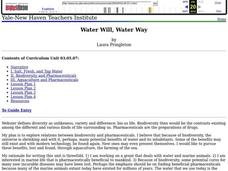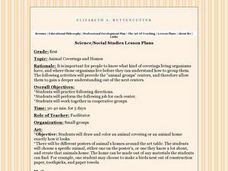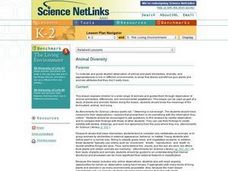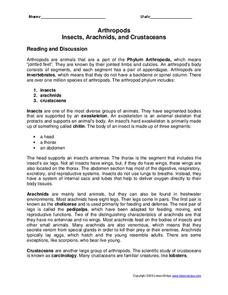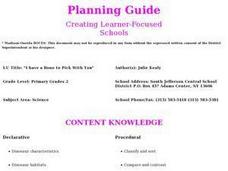Curated OER
The Six Kingdoms
For this evolution worksheet, students will determine the evolutionary relationships among organisms using cladograms and phylogenetic diagrams. This worksheet has 13 short answer questions and 3 multiple choice questions.
Curated OER
Water Will, Water Way
Learners test tap water for hardness and mineral content. In this environmental science lesson, students identify the different stages of the water cycle. They classify plant and animals according to the rules of taxonomy.
Curated OER
Diversity And Adaptations Of Organisms
Eighth graders study how and why animals are classified into eight groups in the animal kingdom. They work together to identify organisms. They use the key to determine the phylum for the included problems.
Curated OER
Classify That!
Young scholars get acquainted with diverse forms of life by using modern biological classification systems to group animals that are related. They explore basic scientific groupings like genus, species, mammals, fish, birds, amphibians,...
Curated OER
Living and Non-Living
Fourth graders are divided into small groups and collect 4 objects from the playground. They take 5 to 10 minutes to classify their groups and discuss their findings including the terms "living" and "non-living". As a class they discuss...
Curated OER
Animal: Unique Creatures With Great Features
Students present models, oral reports, and presentations on animal's characteristics. They research various animals and the characteristics that link them to specific animal groups. They answer specific questions relating to animals in...
Curated OER
Animal Coverings and Homes
First graders research what kind of coverings living organisms have, and where those organisms live before they can understand how to group them. The following activities will precede the "animal groups" centers, and therefore allow them...
Curated OER
Invertebrates
Learners identify the characteristics common to all animals. In groups, they compare the characteristics between the animals and how they are divided. To end the lesson, they compare the eight phyla of invertebrates and review the...
Curated OER
What is an Animal?
In this animal classification worksheet, students will review the characteristics used in classifying animals including the development of animals. Students will compare the endoderm, ectoderm, and mesoderm. This worksheet has 4 short...
Curated OER
Creepy Critters
Students develop a classification scheme based on the structural features of organisms. In this organism lesson students divide into teams and complete a fun activity.
Curated OER
Animal Diversity
Students examine plants and animals for their similarties and differences. They are read stories and note how the animals in the stories do not have the qualities that real animals have. They complete a worksheet to end the lesson.
Curated OER
Animal Diversity
Students use the Animal Diversity E-Sheet to access the Where Can Animals Live? online book.
Curated OER
Bison (American Buffalo)
In this science worksheet, students read the facts sheet for the buffalo. They could use this for a class activity for classifying animals.
Curated OER
Farm Babies
Students use flash cards to match the mother names to the baby names for farm animals. In a designated "barn" in the room, students simulate being mothers, fathers, and babies. The baby must find his mother and father. Students visit...
Curated OER
Creating My Personal Animal ABC Book
Learners conduct Internet research on various animals. They write and create an Animal ABC book, including pictures of each animal, and each animal's phyla and class, to present to a young child.
Curated OER
Home Sweet Home
Students examine the change in the diversity of animals living in an area before and after development. In order to do this, students need to have access to an area near their school which is undeveloped. A good, "real life" activity.
Curated OER
Dissect with Respect
Students, through exercises and discussions, examine ethics involved in the process of choosing and using laboratory animals, respect for the animal they dissect and how to behave in an ethical manner as they dissect various lab specimens.
Curated OER
Arthropods, Insects, Arachnids, and Crustaceans
In this biology worksheet, students read about arthropods and some of the different species that fit into this classification. They then answer 13 questions about what they just learned. The answers are on the last page of the packet.
Curated OER
Ocean Life Zones
For this ocean worksheet, learners answer questions about ocean life, the plants and animals of the ocean and their classification, the major life zones of the ocean and questions about an animal of their choice that lives in the ocean.
Curated OER
A Natural Connection to the Azores
Pupils use primary sources to examine whaling voyages, biology, and geography. In this geography lesson, students analyze ship logs and plot locations of animals and determine routes using latitude and longitude.
Curated OER
Big Cats Sounds
Students explore the sounds of big cats. In this animal science lesson, students listen to the sounds of the big cats, such as lions and tiger, on a suggested website. Students research how the big cats use their sounds and write a...
Curated OER
"I have a Bone to Pick With You"
Second graders explore dinosaur classifications and how animals of long ago became extinct. They conduct research, classify dinosaurs, and in small groups, develop a name of a new dinosaur, create a poster, and present the information to...
Curated OER
Hollow Hilton
Students identify animals that depend on their environment for survival. They describe the relationship between living things. They draw or write an explanation of their findings.
Curated OER
Biodiversity in Illinois-Pond Habitats
Second graders construct a pond habitat in the classroom using a small swimming pool partially filled with water, real cattails, a tree log adjoining, and plastic animal life appropriate to a pond setting. They examine the frog in detail...



